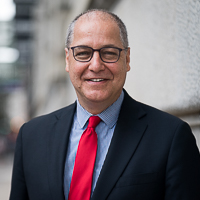The Bedford Citizen, one of the first and most successful hyperlocal websites in the Boston suburbs, has hired its second managing editor. Wayne Braverman, a veteran journalist who most recently worked for Gannett, will succeed Julie McCay Turner, who announced her retirement earlier this year.
Turner and two other women founded the Citizen 10 years ago. Originally an all-volunteer project, the outlet slowly morphed into a professional operation that was able to pay Turner and a part-time staff reporter, Mike Rosenberg. The nonprofit continues to be run by a volunteer board of directors. Braverman’s hiring marks the first time that the Citizen will be run by someone who wasn’t one of the founders and thus represents a rather momentous transition. Turner will remain involved in the Citizen as well.
According to Braverman’s LinkedIn profile, he was editor of Gannett’s Boston Homes publication until about two weeks ago, when Gannett closed the publication. He worked as the internship coordinator for GateHouse Media, Gannett’s predecessor company, from 2002-’16 and has also worked as a radio host and public-speaking instructor. He earned a master’s degree in journalism from Boston University and a bachelor’s degree in political science from UMass Lowell.
The Citizen is among the projects that Ellen Clegg and I are writing about in “What Works,” our book-in-progress about the future of local news.
What follows is a press release from Teri Morrow, the Citizen’s executive director:
I want you to be among the first to know: Wayne Braverman — award-winning journalist and Bedford resident — joins The Bedford Citizen as Managing Editor this week.
Wayne brings both reporting and editorial experience as well as considerable enthusiasm for Bedford to the role.
During his career, Wayne has served as a reporter, senior editor, and managing editor in the Boston area. He’s worked for print and online publications. And he has experience expanding the scope of local news.
As you’ll read this week, Wayne says The Bedford Citizen is “considered by many professional journalists to be the model of how people can come together to create a new media outlet to provide residents with effective coverage of their community.”
I hope you are patting yourself on the back! That’s because you are one of the reasons journalists like Wayne consider The Citizen as a model of local journalism! Thank you for standing up for local news.
Throughout the interview process, Wayne shared that he is “ready to carry on the … mission of The Bedford Citizen.” And that he will “work with our staff and the people of Bedford to take [The Citizen] to its next evolutionary level.”
I hope you are as excited as I am to see what happens in the coming months and years with Wayne in the Managing Editor role. Should you see him around town, please share your thoughts and ideas about The Citizen.











